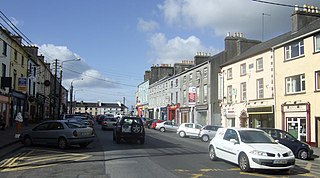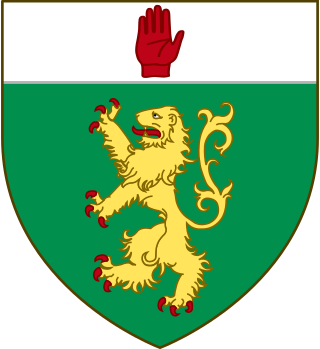
Field Marshal John Standish Surtees Prendergast Vereker, 6th Viscount Gort, was a senior British Army officer. As a young officer during the First World War, he was decorated with the Victoria Cross for his actions during the Battle of the Canal du Nord. During the 1930s he served as Chief of the Imperial General Staff. He is best known for commanding the British Expeditionary Force that was sent to France in the first year of the Second World War, only to be evacuated from Dunkirk the following year. Gort later served as Governor of Gibraltar and Malta, and High Commissioner for Palestine and Transjordan.

The title Duke of Abercorn is a title in the Peerage of Ireland. It was created in 1868 and bestowed upon James Hamilton, 2nd Marquess of Abercorn. Although the Dukedom is in the Peerage of Ireland, it refers to Abercorn, West Lothian, and the Duke also bears four titles in the Peerage of Scotland and two in the Peerage of Great Britain, and is one of three peers who have titles in those three peerages. The Duke of Abercorn also claims the French title of Duke of Châtellerault, created in 1548.

Earl of Gosford is a title in the Peerage of Ireland. It was created in 1806 for Arthur Acheson, 2nd Viscount Gosford.

Earl of Ranfurly, of Dungannon in the County of Tyrone, a title in the Peerage of Ireland, was created in 1831 for Thomas Knox, 2nd Viscount Northland. He had earlier represented County Tyrone in the House of Commons, and had already been created Baron Ranfurly, of Ramphorlie in the County of Renfrew, in the Peerage of the United Kingdom in 1826. Knox was the eldest son of Thomas Knox, who represented Dungannon in the Irish House of Commons. He was created Baron Welles, of Dungannon in the County of Tyrone, in 1781, and Viscount Northland, of Dungannon in the County of Tyrone, in 1791. Both titles were in the Peerage of Ireland. Lord Northland also sat in the British House of Lords as one of the 28 original Irish representative peers.

Viscount Gort is the title of two peerages in British and Irish history. Gort is a small town in County Galway in the West of Ireland. The original title was in the Peerage of Ireland and is extant. A viscountcy with the same title as the Irish peerage was then conferred in the Peerage of the United Kingdom to a later Lord Gort. This gave the distinguished descendant a subtle personal change of status, whilst preserving the heritage of the older title. The United Kingdom title, however, became extinct on the death of the original recipient, who remains perhaps the most illustrious bearer of the older title to date. A post-World War II unqualified reference to "Lord Gort" will almost always be to the sixth viscount.

Viscount Gough, of Goojerat in the Punjab and of the city of Limerick, was a title in the Peerage of the United Kingdom. It was created in 1849 for the Anglo-Irish military commander Hugh Gough, 1st Baron Gough, whose military successes included the First Opium War, the First Anglo-Sikh War, and the Second Anglo-Sikh War. He had already been created a baronet, of Synone and Drangan, in the Baronetage of the United Kingdom, on 23 December 1842, and Baron Gough, of ChingKangFoo in China and of Maharajpore and the Sutlej in the East Indies, in 1846, also in the Peerage of the United Kingdom. Lord Gough later became a field marshal. The titles became extinct in 2023 following the death of the 5th Viscount.

Gort is a town of around 2,800 inhabitants in County Galway in the west of Ireland. Located near the border with County Clare, the town lies between the Burren and the Slieve Aughty and is served by the R458 and R460 regional roads, which connect to the M18 motorway.
Benburb ) is a village and townland in County Tyrone, Northern Ireland. It lies 7.5 miles from Armagh and 8 miles from Dungannon. The River Blackwater runs alongside the village as does the Ulster Canal.
Baron Beresford is a title that was created three times for the Beresford family, one in the Peerage of Ireland and later also two in the Peerage of the United Kingdom. In all instances it was created for men who were eminent politicians or soldiers. The first creation still exists as a subsidiary title, but the latter two became extinct at the death of their original holder.
Carrick is an Anglicised version of creag/carraig, Gaelic for "rock", and may refer to:

Ardboe is a large parish civil parish in east County Tyrone, Northern Ireland. It borders the western shore of Lough Neagh and lies within the Mid Ulster District Council area. It is also the name of the local civil parish, which incorporates both Mullinahoe and Moortown.

Magennis, also spelled Maguiness or McGuinness, is an Irish surname, meaning the "son of Angus", which in eastern Ulster was commonly pronounced in Irish as Mag/Mac Aonghusa. A prominent branch of the Uíbh Eachach Cobha, the Magennises would become chiefs of the territory of Iveagh, which by the 16th century comprised over half of modern County Down. By the end of the 17th century, their territory had been divided up between them, the McCartan chiefs and English prospectors.
Standish Robert Gage Prendergast Vereker, 7th Viscount Gort, was an Anglo-Irish peer, connoisseur and collector of fine art, antiques, and objets d'art, whose seat was at Hamsterley Hall, County Durham. He was appointed High Sheriff of Durham in 1934. He was the brother of John Vereker, 6th Viscount Gort, and inherited that title on the death of Lord Gort without male issue in 1946. He was succeeded in turn by his cousin, Colin Vereker.

Charles Vereker, 2nd Viscount Gort PC (Ire), known as Charles Vereker until 1817, was an Irish soldier and politician.
Mountcastle may refer to:
Vereker is a surname. Notable people with the surname include:
John Gage Prendergast Vereker, 5th Viscount Gort was an Anglo-Irish peer, landowner and Army officer.







